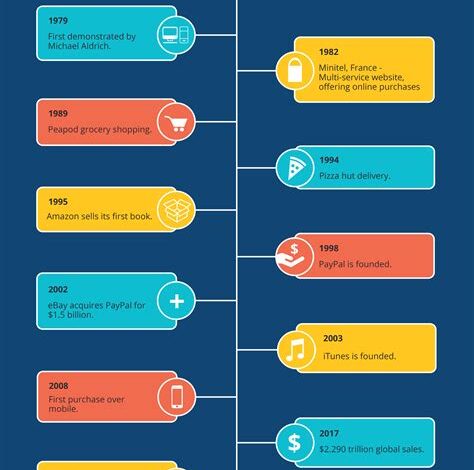The Evolution of E-commerce Technology

Discover the evolution of e-commerce from its early platforms to the integration of AI and blockchain, and the impact on online shopping.In the past few decades, e-commerce technology has evolved at an unprecedented rate, transforming the way we shop and do business. From the early days of basic online platforms to the integration of cutting-edge technologies like artificial intelligence and blockchain, the e-commerce industry has come a long way. This blog post will explore the fascinating journey of e-commerce technology, from its humble beginnings to its current state of innovation and advancement. We will delve into the emergence of early e-commerce platforms, the game-changing introduction of online payments, the revolutionary advancements in mobile commerce, the integration of AI in e-commerce, and the transformative impact of blockchain on online shopping. Join us as we take a trip down memory lane and explore the incredible evolution of e-commerce technology.
Early E-commerce Platforms
E-commerce, as we know it today, has evolved from its early beginnings when the internet was still in its infancy. The earliest e-commerce platforms were simple and rudimentary, with basic functionalities such as product listings and online ordering. These platforms were typically built on static HTML pages, and lacked the dynamic features that we see in modern e-commerce websites. Despite these limitations, they laid the groundwork for the online shopping experience that we are familiar with today.
One of the earliest e-commerce platforms to gain popularity was eBay, which was founded in 1995. eBay provided a platform for individuals to buy and sell goods online, creating a virtual marketplace that revolutionized the way people conducted transactions. Another early player in the e-commerce space was Amazon, which originally started as an online bookstore before expanding into a wide range of products. These early platforms paved the way for the massive e-commerce industry that we see today.
Early e-commerce platforms also had to overcome numerous challenges, such as security concerns and limited payment options. These platforms lacked the robust security measures that we have today, making consumers hesitant to shop online. Additionally, online payment gateways were still in their infancy, with limited options for processing transactions securely. Despite these challenges, these early e-commerce platforms laid the foundation for the advancements in technology and security that we now take for granted.
Introduction of Online Payments
Online payments have revolutionized the way we shop and conduct financial transactions. In the early days of e-commerce, customers had limited options for making purchases online. Cash on delivery was the main method of payment, which was not always convenient for customers or businesses. However, the introduction of online payments completely changed the game.
With the advent of secure online payment gateways, customers gained the ability to make purchases with a simple click of a button. This led to a significant increase in online sales and a surge in the popularity of e-commerce. Businesses also benefited from the convenience and security of online payments, as it allowed them to expand their customer base and streamline their financial processes.
As online payment technology continues to advance, the future of e-commerce looks promising. With the integration of new payment options and the implementation of advanced security measures, online payments have become an essential component of the digital economy.
Advancements in Mobile Commerce
Advancements in Mobile Commerce
Mobile commerce, also known as m-commerce, has experienced significant advancements in recent years. With the widespread use of smartphones and other mobile devices, people now have the ability to shop and make purchases anytime and anywhere. This has revolutionized the way people engage in commercial transactions, leading to several key advancements in the field of mobile commerce.
One major advancement in mobile commerce is the development of mobile payment systems. These systems allow users to store payment information on their mobile devices and make secure, convenient transactions with just a few taps. Mobile payment platforms such as Apple Pay, Google Pay, and Samsung Pay have gained popularity, providing users with a seamless and efficient way to make purchases on their smartphones.
Another significant advancement in mobile commerce is the rise of mobile shopping apps. Many retailers and e-commerce companies have invested in the development of mobile apps that offer a user-friendly interface and enhanced shopping experience. These apps often include features such as personalized recommendations, exclusive deals, and easy navigation, making it easier for consumers to browse, compare, and purchase products on their mobile devices.
Integration of AI in E-commerce
Artificial Intelligence (AI) has revolutionized the e-commerce industry in recent years, significantly impacting the way businesses operate and the customer shopping experience. With the integration of AI technology, online retailers are able to analyze vast amounts of data to understand consumer behavior, preferences, and habits. This data enables personalized product recommendations, efficient customer support, and targeted marketing campaigns.
Moreover, AI-powered chatbots and virtual assistants have enhanced the customer service experience by providing instant support and addressing queries in real-time. These virtual assistants are capable of understanding and responding to natural language, providing a seamless and interactive shopping experience for customers.
Additionally, AI algorithms have been utilized to optimize pricing strategies, inventory management, and demand forecasting. By leveraging machine learning algorithms, e-commerce businesses can dynamically adjust prices based on market trends, competitor pricing, and customer demand, ultimately maximizing revenue and profitability.
Impact of Blockchain on Online Shopping
Blockchain, the revolutionary technology behind cryptocurrencies like Bitcoin, has also made a significant impact on online shopping. By providing a secure and transparent way of recording transactions, blockchain technology has helped improve the trust and security of online shopping platforms. The decentralized nature of blockchain ensures that the data stored on it is not controlled by any single entity, making it resistant to tampering and fraud.
With blockchain, online shoppers can have increased confidence in the authenticity of products, as the technology allows for the tracking and verification of the supply chain. This means that consumers can be assured of the quality and origin of the items they purchase, leading to greater trust and satisfaction in the online shopping experience.
Furthermore, blockchain has the potential to streamline the payment process in online shopping, by enabling secure and efficient transactions through cryptocurrency. This can lead to lower transaction fees and faster payment processing, benefiting both consumers and merchants. The impact of blockchain on online shopping is thus far-reaching, offering improved security, trust, and efficiency to the e-commerce industry.





